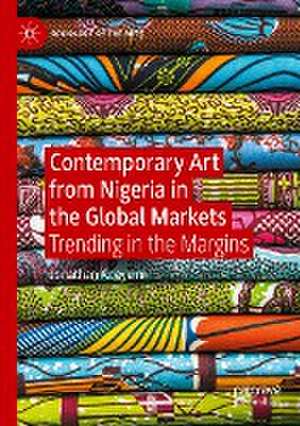Contemporary Art from Nigeria in the Global Markets: Trending in the Margins: Sociology of the Arts
Autor Jonathan Adeyemien Limba Engleză Paperback – 8 dec 2023
It will therefore be useful to students and researchers in the sociology of art, art market studies, art history and culture polity.
| Toate formatele și edițiile | Preț | Express |
|---|---|---|
| Paperback (1) | 776.57 lei 6-8 săpt. | |
| Springer International Publishing – 8 dec 2023 | 776.57 lei 6-8 săpt. | |
| Hardback (1) | 781.62 lei 6-8 săpt. | |
| Springer International Publishing – 8 dec 2022 | 781.62 lei 6-8 săpt. |
Preț: 776.57 lei
Preț vechi: 947.04 lei
-18% Nou
Puncte Express: 1165
Preț estimativ în valută:
148.59€ • 155.70$ • 122.84£
148.59€ • 155.70$ • 122.84£
Carte tipărită la comandă
Livrare economică 12-26 aprilie
Preluare comenzi: 021 569.72.76
Specificații
ISBN-13: 9783031175367
ISBN-10: 3031175360
Ilustrații: XIX, 215 p. 51 illus.
Dimensiuni: 148 x 210 mm
Greutate: 0.29 kg
Ediția:1st ed. 2022
Editura: Springer International Publishing
Colecția Palgrave Macmillan
Seria Sociology of the Arts
Locul publicării:Cham, Switzerland
ISBN-10: 3031175360
Ilustrații: XIX, 215 p. 51 illus.
Dimensiuni: 148 x 210 mm
Greutate: 0.29 kg
Ediția:1st ed. 2022
Editura: Springer International Publishing
Colecția Palgrave Macmillan
Seria Sociology of the Arts
Locul publicării:Cham, Switzerland
Cuprins
1.Introduction.- 2.Sub-Saharan Africa in the global art market’s structure.- 3.The Development of Contemporary Art in Nigeria.- 4.Aesthetic Influences of Cultural Nationalism and Decolonization.- 5.Transnational influences, authenticity censure and postcolonial exclusion.- 6.Evolution of the Market for Contemporary Art.- 7.Contemporary Art from Nigeria in International Spaces.- 8.Systems of Art Governance.- 9.Power Dynamics and Alternative Systems
Notă biografică
Jonathan Adeyemi holds a BA (Hons), MA in African Studies (Art History), and an MBA in marketing management. He obtained a Ph.D. in Arts Management and Cultural Policy from Queen’s University Belfast in the United Kingdom. Dr. Adeyemi was an Associate Lecturer in Arts Management and Cultural Policy at Queen’s University Belfast. He also served as the Coordinator of Creative Arts at the West African Examinations Council (WAEC), where he was responsible for art education curriculum development and administration. With a paper titled: Power Dynamics in the art world: Navigating alternative systems, Dr. Adeyemi won the 2021 Ph.D. Student Research Award of the Sociology of Arts Research Networks (RN02), European Sociological Association (ESA). He contributed a chapter titled: Systematisation of Art in Nigeria to the Cuyler A. edited volume: Arts Management, Cultural Policy & the African Diaspora for Palgrave Macmillan. He is a member of The International Art Markets Studies Association (TIAMSA) and the European Sociological Association (ESA).
Textul de pe ultima copertă
"Jonathan Adeyemi’s book has arrived at the right time when the attraction for contemporary "African" art has never been so strong in the market and in the world of international contemporary art. It is appropriate to underscore the relevance of the intellectual project of this pioneering work. The book is an important contribution not only to the socio-economic approach of art markets and art worlds in Nigeria, and more widely, in Africa, but also to the socio-economics of art as a whole. It is also an important contribution to what the sociology of “globalization” should be.
-Alain Quemin, Exceptional class professor of sociology of art, GEMASS – Sorbonne Université, Senior Member of Institut Universitaire de France
"Given the strong interest in art from the African continent, this is an extremely timely book. Adeyemi offers the reader a new and original account of the evolution of a contemporary art world in Nigeria, and the integration of Nigerian art in the global art system, which is fraught with complexities and tensions for which Nigerian artists are facing an uphill battle. Based on interviews with many of the key players in the Nigerian art world, this book should be on the reading list of scholars interested in contemporary art from the African continent."
-Olav Velthuis, Professor of Sociology and Director of the Cultural Sociology Program Group, University of Amsterdam, Netherlands
Caracteristici
Reflects a shifting focus on art markets outside the traditional centers of Europe and America to the Global South Highlights the situation of arts governance and cultural policy in Nigeria and Africa more broadly Argues for global modernism and a corrective to Eurocentric art historiography














